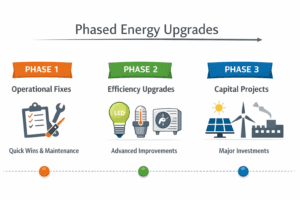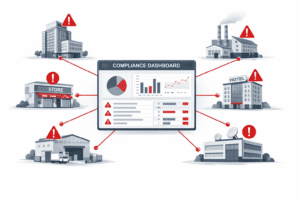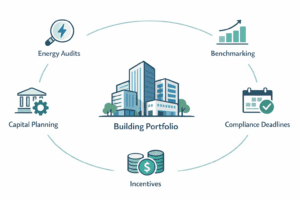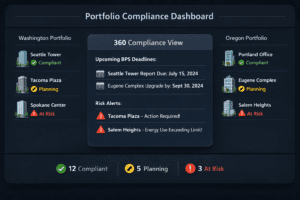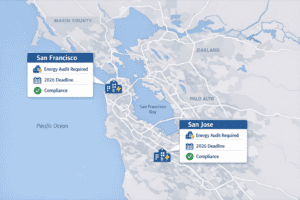I. Introduction
A. Brief Explanation of Energy Audits
An energy audit is a methodical assessment and analysis of a building’s energy flows. Its primary purpose is to identify opportunities to enhance energy efficiency, thereby reducing energy input without negatively affecting output. Businesses and residential properties alike can benefit from these audits, as they provide actionable insights into how energy is consumed and wasted within a facility.
B. The Importance of Energy Audits in Modern Times
Today, energy conservation is more than just saving on utility bills; it’s about proactive environmental stewardship and sustainability. Efficient energy use can significantly mitigate the environmental impact, reducing carbon footprint and promoting a healthier environment. This is particularly pertinent as cities like San Jose strive towards ambitious Green Building Standards and energy sustainability goals.
C. Introduction to the Concept of Benchmarking in Energy Auditing
Benchmarking in energy audits is essentially the process of comparing one building’s energy performance to that of a similar set’s average. This not only highlights how a building is performing against its peers but also sets a framework for implementing effective energy-saving measures.
2. Understanding Benchmarking in Energy Audits
A. Detailed Explanation of Benchmarking
Benchmarking involves collecting data about a building’s energy use and comparing it to existing standards or similar properties. This comparison is crucial as it helps building managers understand where their properties stand in terms of energy efficiency. Tools like the EPA’s ENERGY STAR Portfolio Manager are often used in this process.
B. The Traditional Role and Function of Benchmarking in Energy Audits
Historically, benchmarking has served as a diagnostic tool, helping identify if a building is an energy over-user or under-user. This initial step is critical in the energy audit process as it directs auditors on where to focus their efforts for detailed analysis and improvements.
C. The Pros and Cons of Benchmarking
Pros:
– Provides a standardized method to evaluate efficiency.
– Helps in setting realistic energy-saving goals.
Cons:
– Over-reliance on general metrics that may not be entirely applicable to every unique building scenario.
– Potential lack of motivation to exceed beyond the norms, hence stifling innovation and exceptional performance improvements.
III. The Need for Advanced Energy Audits in San Jose
A. Overview of Energy Consumption in San Jose – Why It Matters?
In a bustling city like San Jose, where technological advancements and urban growth are continuous, energy consumption patterns can be complex and varied. This makes it imperative not only to manage but optimize energy use for long-term sustainability, reducing both costs and environmental impact.
B. The Role of Regulatory Bodies, Both Local and Statewide
State and local bodies in California are at the forefront of setting regulations that demand high standards of energy efficiency. Programs and initiatives, supported by policies at the municipal level in San Jose, push for advancements in energy audits and the implementation of more stringent energy management practices.
C. The Limitations of Current Benchmarking Strategies
While traditional benchmarking provides a solid groundwork, it often falls short in addressing deeper, systemic energy inefficiencies that require more sophisticated approaches to be identified and rectified.
IV. Going Beyond Benchmarking – Advanced Energy Audits
A. Introduction to Advanced Energy Audits
Advanced energy audits incorporate detailed data analytics and cutting-edge technology to create a more accurate and dynamic picture of energy consumption than traditional methods can provide. These audits use real-time data tracking and involve a more granular approach to diagnosing and rectifying inefficiencies.
B. Difference Between Traditional Benchmarking and Advanced Energy Audits
While traditional benchmarking offers a snapshot based on past data, advanced energy audits provide ongoing monitoring and predictive analysis, enabling proactive management of energy consumption which is crucial for adapting to changing use patterns and technologies.
C. How Advanced Energy Audits Offer a More Comprehensive Picture of Energy Usage
Advanced energy audits use tools like IoT sensors and advanced software analytics to monitor energy consumption in real-time. This allows for immediate identification of anomalies and inefficiencies, enabling quicker reactions and continuous improvement in energy management.
V. How to Implement Advanced Energy Audits
A. Step-by-Step Guide to Transitioning from Benchmarking to Advanced Energy Audits
- Evaluation and Planning: Understand the scope and objectives of advancing to a higher level of auditing.
- Deployment of Advanced Tools: Integrate IoT-based sensors and implement energy management systems such as those provided by companies like Siemens.
- Data Analysis and Reports: Utilize advanced analytic tools to decipher the data collected and generate insightful energy audit reports.
- Implementation and Follow-up: Apply the recommended changes and continuously monitor to ensure sustained energy efficiency improvements.
B. Required Resources and Potential Challenges
Advanced audits can be resource-intensive. They require investments in technology and skilled personnel to interpret data and recommend solutions. The initial financial outlay can be a challenge for some businesses, but the long-term savings and benefits often offset these costs.
C. Tips to Ensure a Smooth Transition
– Secure Stakeholder Buy-in: Demonstrate the long-term benefits to secure support.
– Focus on Training: Equip your team with the necessary skills to manage new technologies and processes.
– Gradual Implementation: Start with critical areas and scale up based on initial successes.
VII. The Future of Energy Audits in San Jose
A. The Potential Impact of Advanced Energy Audits on San Jose’s Energy Footprint
Adopting advanced energy audits could dramatically transform San Jose’s landscape into a model of energy efficiency and sustainability. The reduced energy consumption and enhanced performance of buildings could set a new standard for urban development.
B. Future Technological Advancements in the Field of Energy Auditing
The future is likely to bring even more sophisticated technologies into the realm of energy auditing, with AI and machine learning leading the way. These tools will provide even greater insights and automation, further simplifying the process of energy management.
VIII. Conclusion
A. Recap of Main Points
From understanding the basic concepts of benchmarking to exploring the depths of advanced energy audits, we have journeyed through the evolving landscape of energy management in San Jose. The transition to advanced energy audits is not just a step but a leap towards achieving remarkable energy efficiency.
B. Final Thoughts on the Significance of Advancing Beyond Benchmarking in Energy Audits
Advanced energy audits represent the future of building energy management. They push the boundaries of traditional benchmarking, providing deeper insights and more effective control over energy consumption.
B. Call to Action for Businesses in San Jose to Adopt Advanced Energy Audits
For businesses in San Jose, moving towards advanced energy audits is no longer optional but essential. To start your transition, consider consulting with energy efficiency experts and exploring state-supported energy audit initiatives. Take a proactive step towards sustainability and enhanced efficiency by embracing advanced energy audits today.
VertPro.com serves as a resourceful platform for property owners and managers seeking to enhance their buildings’ energy efficiency. The site offers a range of services, including Commercial Energy Audits, Benchmark Compliance consultancy, and a Construction Marketplace. At the heart of VertPro® is a suite of SaaS technology-based solutions designed to assist in navigating the complexities of Energy Benchmarking and Energy Audits/RCx Plus, while ensuring adherence to over 60 Energy Benchmarking and Energy Efficiency Laws across the country.
For those looking to improve their property’s energy usage and operational value, VertPro.com provides a diverse array of tools and information. The site aims to facilitate a better understanding of energy efficiency practices and legislation, helping building owners and property managers make informed decisions about their energy strategies while complying with all energy ordinances and laws.





